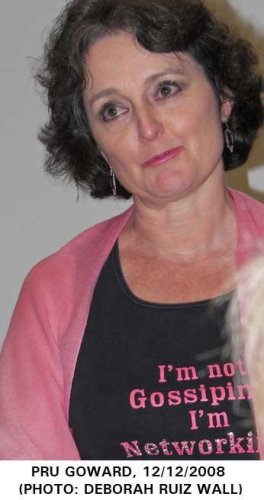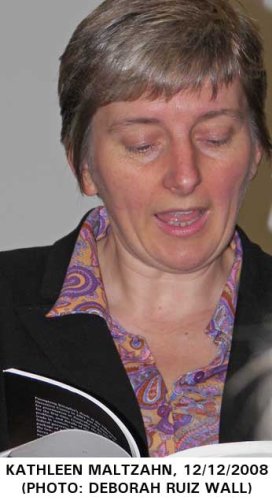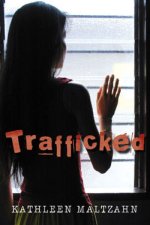
“She is a saint who would do her work for nothing!” exclaimed Pru Goward, M.P. for Goulburn, NSW, referring to Kathleen Maltzahn whose book, Trafficked she launched at the NSW Parliament House on 12th December. Returning the compliment, Maltzahn praised Goward, former Federal Sex Discrimination Commissioner for putting trafficked women’s issues on the national agenda through the weight of her position and influence.
Trafficked, Maltzahn’s 125–page book which took four years to write is an essential resource for judges, lawyers, community workers, and anyone else who needs to grapple with the complexity of issues to do with trafficking and prostitution.
Misogyny and an utter lack of empathy for the plight of trafficked women often result in their further victimisation even after they take the courage to give evidence against the perpetrators. “Even a prostitute has a choice and has rights,” Goward stressed. Indeed Australia is part of a trafficking network, but in Australia, it could also be run like a cottage industry by small–time independent operators. Most trafficked women in Australia come from Thailand, China and Korea. They enter the country on student visas, tourist visas or protection visas applied for in their names by their traffickers. Trafficking is nothing short of slavery.
Maltzahn asked rhetorically, how could a woman in the twenty–first century here in Australia still be enslaved? Whilst under the Criminal Code Amendment (Slavery and Sexual Servitude) Act 1999, the severity of the crime being committed could be recognised, slavery as defined in the act, was almost impossible to prove. Proving ‘ownership rights’ exercised over another person was difficult because psychological imprisonment and the associated fear from death threats, as well as threats to the safety of families back home, were not often seen as slavery. Maltzahn explained, “what the defence couldn’t talk away was the fear that locked the women in as effectively as physical locks.” The gravity of psychological violence against women is only beginning to be recognised.
Take the Bridging F visa, introduced in 2003, for example. The idea is to give women who have escaped traffickers, time for reflection to consider their options. The government expects them to help with prosecuting traffickers. From a law enforcer’s perspective, the longer trafficked women take their time, the ‘colder the evidence trail’. The bridging visa only allows women to stay up to a month at a time. As soon as they helped the police, they were told they had two to three days to leave the country. As for those who did not want to disclose their experience to the police, they were repatriated.
Maltzahn remembers a case where a woman, through an interpreter, said it was all very well for her, from the safety of Australia, to go to the police and ask for help but could the police protect her family? What right did she have to sacrifice them for her own safety?
A more nuanced understanding of the situation of those ensnared in trafficking would help eliminate entrenched prejudices and fixed positions. Lawyers, judges and the police seem to put more emphasis on prosecution rather than the women’s recovery from their ordeal. As for the Federal Government, it seems more interested in implementing ‘border control’ (deporting ‘unlawful non–citizens’) than in helping victims who face detention and deportation. I suggested to Goward that this inclination probably has bipartisan support in Parliament, and she nodded.
Della Ipong, a psychologist asked if psychological intervention is provided for the women or, at least, access to counselling. Maltzahn said that they were not likely to access counselling as they still need to process their experience. Project Respect, a non–government organisation that provides outreach to women in the sex industry across Melbourne, tries to offer a range of services including drama workshops which help women deal with their trauma. Project Respect’s approach is ‘holistic’, difficult, yet women find it ‘cathartic’.
Amy, one of the trafficked women, thought her circumstances in Australia would be similar to Japan where she had a choice. There she could just let the customer buy her a drink and then decide for herself if she wanted to go further than entertainment, such as doing prostitution. Her time in Australia was a horrific awakening. No bar to entertain men, no choice about customers, no way of escaping cruel customers, so she would simply be pushed back in the room and left to be raped. What is worse is women find the stigma very strong to the point that they blame themselves profoundly.
In terms of the effectiveness of therapy, Maltzahn favours the idea of women expanding their own community, and with their strength and resolve, they let men realize that women in such a situation are being enslaved. Sometimes, when the women talk to their clients, the clients themselves become their allies and are instrumental in helping them escape the traffickers.
I first met Maltzahn in Manila when I joined an anti–sex tourism study tour to the Philippines in 1995.[1] She was involved in supporting ‘prostituted women’, a term stressed by feminist activists which shifts the gaze onto the perpetrators rather than on the aggrieved women. Whilst still recognising the advantages of organizing in a ‘collective’ or a union to protect women from sexually transmitted diseases and to ensure that consent in the transaction is genuine, the community support workers there were not comfortable with the idea of prostitution as ‘work’, or as an industry. If it were a real career option, they argued, would a child naturally aspire that ‘when I grow up, I would like to be a prostitute!’
In the Philippines, they wanted prostituted women to think about an alternative livelihood. In the same vein, Project Respect supports one trafficked woman’s vision of establishing a noodle bar franchise that would provide an activity for women who had been trafficked. It’s “more than just a job thing,” Maltzahn said. A business plan was completed in early 2008, with the aim of raising Aus $200,000 for its establishment.
The money raised will help to employ and support women who have been trafficked to Australia for prostitution, retrain survivors of trafficking and provide them with business skills, and establish a Thai Noodle Bar with equipment, stock and cover rental fees.

“According to a 2004 article by Gunilla Ekberg, then from the Ministry of Industry, Employment, and Communications, the Swedish government understands that: “…the purpose of the recruitment, transport, sale, or purchase of women and girls by traffickers, pimps, and members of organised crime groups within countries or across national borders is, in the overwhelming majority of cases, to sell these female human beings into the prostitution industry. Accordingly, it is argued that trafficking in human beings for sexual purposes will never be eliminated unless the international community also takes a vigorous stand and puts in place concrete measures against prostitution and sexual exploitation.” [3] Another move in the right direction is the issue of change of orientation or mind shift through education. Maltzahn suggests that the government funds training for migration agents, lawyers, health workers, domestic violence workers and community representatives who encounter trafficked women in their work and services.
She is impressed with the difference good training has made with the Australian Federal Police (AFP). The AFP’s treatment of women had improved noticeably since it started to provide training for up to three weeks at a time for its officers on trafficking and child sex tourism.
Since the government’s undertaking in 2003 to “comprehensively criminalise trafficking activity”, a significant improvement was made in recognising the unworkable aspects of the 1999 Act, and in June 2005, the Criminal Code Amendment (Trafficking in Persons Offences) Act 2005 was passed.
The result is heartening. The AFP’s Transnational Sexual Exploitation and Trafficking teams conducted more than 150 investigations and assessments of trafficking allegations since January 2004. Charges had been laid against 34 people. By May 2008, there had been seven convictions, five for slavery and two for sexual servitude. Seven trafficking related matters involving 18 defendants were before the courts — three of which were at the appeal phase.[4]
Maltzahn acknowledged that the broadening of her own understanding and insight came from her experience in the Philippines working with NGOs who were aware for a long time of the globalised nature of the sex industry. When she returned to Australia, she established Project Respect dedicated to working with women in the sex industry. In Australia, she found specific help in Melbourne from Onnie Wilson and Melba Marginson and from the Centre for Philippine Concerns in Brisbane and Solidarity Philippines Australia Network, enabling her to access information she would otherwise not have had.
Her concluding remarks at the launch of Trafficked:
“I wrote the book to help change things. I ask you to be part of that change.”
[1] See Confronting Sexual Exploitation, Campaign Against Sex Tourism and Trafficking in Filipino Women, report of the participants from Australia and Aotearoa/N.Z. exposure/study tour to the Philippines June 19–July 4, 1995, eds. Emere Distor & Dee Hunt, Centre for Philippine Concerns–Australia Brisbane Branch, 1996.
[2] Malzahn calls for ‘a short–term amnesty, available until Australia improves its trafficking programs.’ Kathleen Maltzahn (2008), Trafficked, UNWS, Sydney, p. 103
[3] Ekberg, Gunilla, ‘The Swedish Law That Prohibits the Purchase of Sexual Services: Best Practices for Prevention of Prostitution and Trafficking in Human Beings’, in Violence Against Women, Vol. 10 No. 10, October 2004, pp. 1187–1218, Sage Periodicals Press.
[4] Source: Tracy Heffernan, Public Affairs Officer, Chief of Staff Portfolio, AFP, 8 May 2008 (email correspondence with Kathleen Maltzahn), cf. Maltzhan, op.cit, p.98

To support the development of ‘Thai Life’ Noodle Bar in Melbourne, contact:
Project Respect, P.O. Box 1323, Collingwood, Vic 3066 Australia.
Phone: 03 9416 3401 — Fax: 03 9417 0833
Email: info@projectrespect.org.au
All donations over $2.00 are tax deductible. Payment options: Cash, Cheque or Credit Card.
For more information visit the website at http://www.projectrespect.org.au
 Deborah Ruiz Wall
Deborah Ruiz Wall
See also:
 Home | Aims and Objectives of Solidarity Philippines Australia Network | About Kasama
Home | Aims and Objectives of Solidarity Philippines Australia Network | About Kasama 
Search the SPAN Web